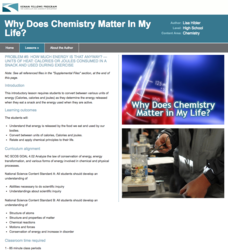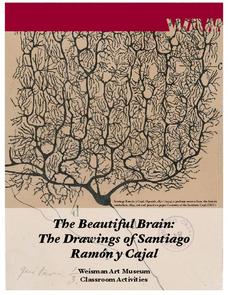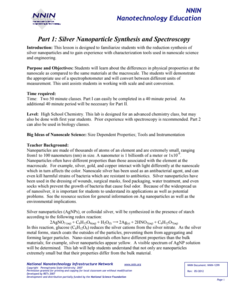University of Minnesota
Beautiful Brain: Brain Inspiration
"Neuroscientists consider Cajal as important to their discipline as Einstein is to physics." The first of four lessons has scholars view Santiago Ramon y Cajal's drawings of neurons. They reflect and respond to the art through writing...
Cornell University
Chemical Reactions
Investigate the Law of Conservation of Mass through a lab exploration. Individuals combine materials to initiate chemical reactions. They monitor for signs of reactions and measure the masses before and after the reactions for...
Kenan Fellows
How Much Energy Is That Anyway?
The fifth lesson in the six part series introduces units of energy including calories, Calories, and joules. Scholars determine the energy released when eating a snack and during activity.
California Academy of Science
Banishing Bycatch
Bycatch is a sad reality for many sea turtles, dolphins, and sharks; it occurs when they get unintentionally caught in commercial fishing nets. The class plays a game using popcorn and crackers, each child will attempt to catch the...
NOAA
Plate Tectonics I
Young geologists get a glimpse beneath the earth's surface in this plate tectonics investigation. After first learning about the different layers of the earth and the constant movement of its plates, young...
American Chemical Society
Isolation of Phytochrome
Why do soybean plants that are planted weeks apart in the spring mature simultaneously in the fall? Four independent activities cover the history of phytochrome research, scientist collaboration, the electromagnetic spectrum, and...
Chicago Botanic Garden
Faces of Climate Change
You know global warming is real when your squirrel feeder is full of popped corn instead of kernels! Activity two in a series of five allows learners to explore climate change through the eyes of another. After briefly analyzing their...
University of Minnesota
Beautiful Brain: Strangest Dream
Do words change or add meaning or interest to a work of art? The final lesson in a four-part series on the beautiful brain as a work of art focuses on art analysis. Scholars write a story about exploring art from the inside. Reflections...
California Academy of Science
Fresh Solutions: Design Thinking Challenge
How do people transport fresh water long distances to ensure everyone has access to it? The final activity in the 10-part Fresh Solutions unit encourages individuals to design their own solution, or solutions, to that very problem....
Sea World
Marine Animal Husbandry and Training
Step into the role of a zoo director with several activities about animal training and running a zoo. Kids calculate the amount of food each animal needs, design a habitat for penguins, decide how to breed bottlenose dolphins, and train...
National Wildlife Federation
Branching Out – Exploring Dendrochronology
Tree rings from North America give a continuous history of El Nino intensity over the last 1,100 years. Scholars learn how scientists use tree rings to create timelines demonstrating variations in weather patterns. The cumulative...
National Nanotechnology Infrastructure Network
Silver Nanoparticle Synthesis and Spectroscopy
Certain materials do not always maintain the same physical properties when they exist in the nanoscale. Help your classes to explore this idea through an experimental lesson. Scholars use spectroscopy with samples of silver solution...
WolfQuest
The Return of Gray Wolves to Yellowstone National Park: Right or Wrong?
Should gray wolves be removed from Yellowstone National Park? After researching the complex relationships between the various habitats and species at Yellowstone National Park, including humans, class members take a position...
Curated OER
Build A Borneo Glider!
Students construct a paper glider. In this physics of gliding instructional activity, students first learn about Borneo and it's rainforest habitat. After students discover the way animals in Borneo glide from tree to tree, they use...
Georgian Court University
Introduction to Marsh Ecology
Compare and contrast the characteristics of fresh and salt water marshes. After exploring the typical plants and animals found in each marsh type, participants use a set of flash cards to sort into fresh and salt water marsh life. Their...
American Chemical Society
Development of Baking Powder
Did you know baking powder can be used to treat acne, whiten teeth, and make sugar cookies? The lesson on the development of baking powder is ready-to-go with no preparation required. Through readings, pupils answer questions, complete...
American Chemical Society
The Discovery of Fullerenes
Carbon is the most common element on earth, so the innovative discovery of a new type of carbon molecule won the 1996 Nobel Prize. In the ready-to-go lesson, scholars learn about C60 and how it has opened up the entire area of...
NOAA
Ocean Exploration
Sea explorers and scientists have found that because of temperatures being two to three degrees Celsius at the bottom of the ocean, most animals are lethargic in order to conserve energy. In this web quest, pairs of learners read about...
Chicago Botanic Garden
Plant Phenology Data Analysis
Beginning in 1851, Thoreau recorded the dates of the first spring blooms in Concord, and this data is helping scientists analyze climate change! The culminating instructional activity in the series of four has pupils graph and analyze...
Cornell University
The Galvanic Cell Game
Play a little game with your classes! Young scholars expand on their understanding of oxidation/reduction reactions in a game-based activity. They build a Galvanic cell with game pieces while learning about each component and their...
Cornell University
Polymerization
Explore condensation polymerization and additive polymerization through hands-on activities. Young scholars first model additive polymerization with paperclips. They finish the activity by using condensation polymerization to create a...
National Nanotechnology Infrastructure Network
Help or Hype: The Ethics of Bio-Nanotechnology
Ethical concerns are not always black and white. A well-designed lesson presents learners with scenarios for which ethics may come into question. Scholars learn to consider the different sides of a situation and make an unbiased...
Serendip
DNA
Get up close and personal with DNA! A two-part hands-on activity has learners extract DNA from a small organism and then their own cheek cells. Scholars then explore DNA replication using questions to guide their analyses.
California Academy of Science
Carbon Cycle Role Play
Anytime you make concepts clear with role playing or hands-on experience, it's a win for the whole class. Ping-Pong balls are used to represent carbon in a carbon cycle role-play activity. In small groups, children first discuss what...























